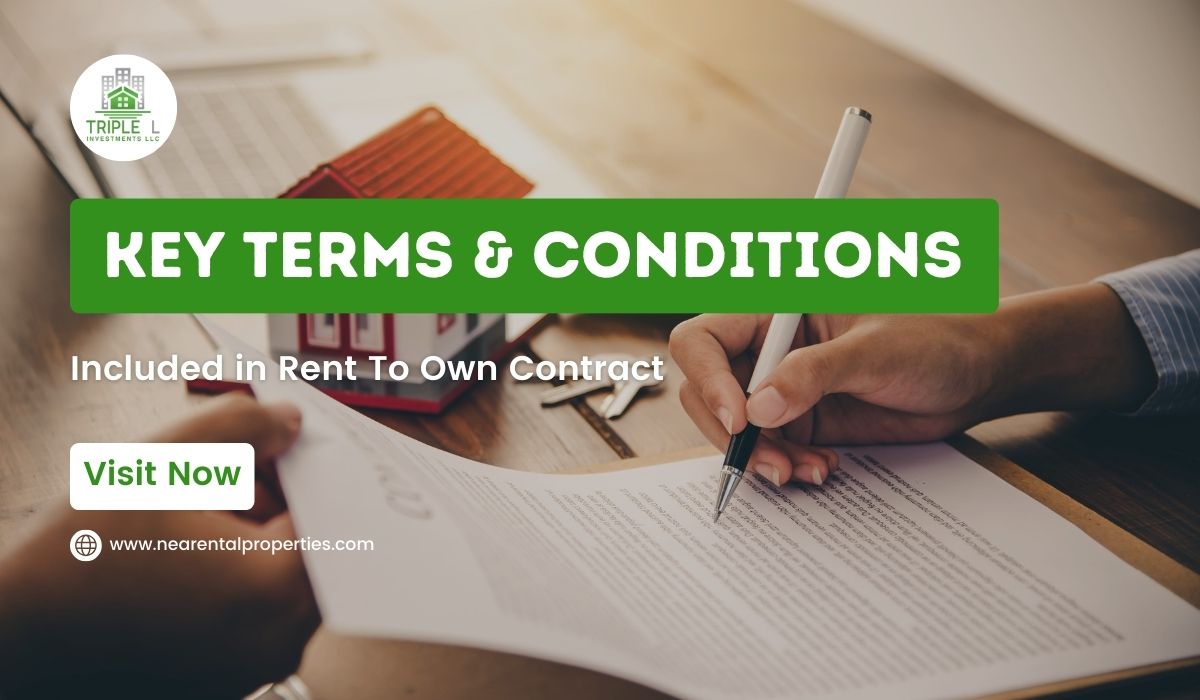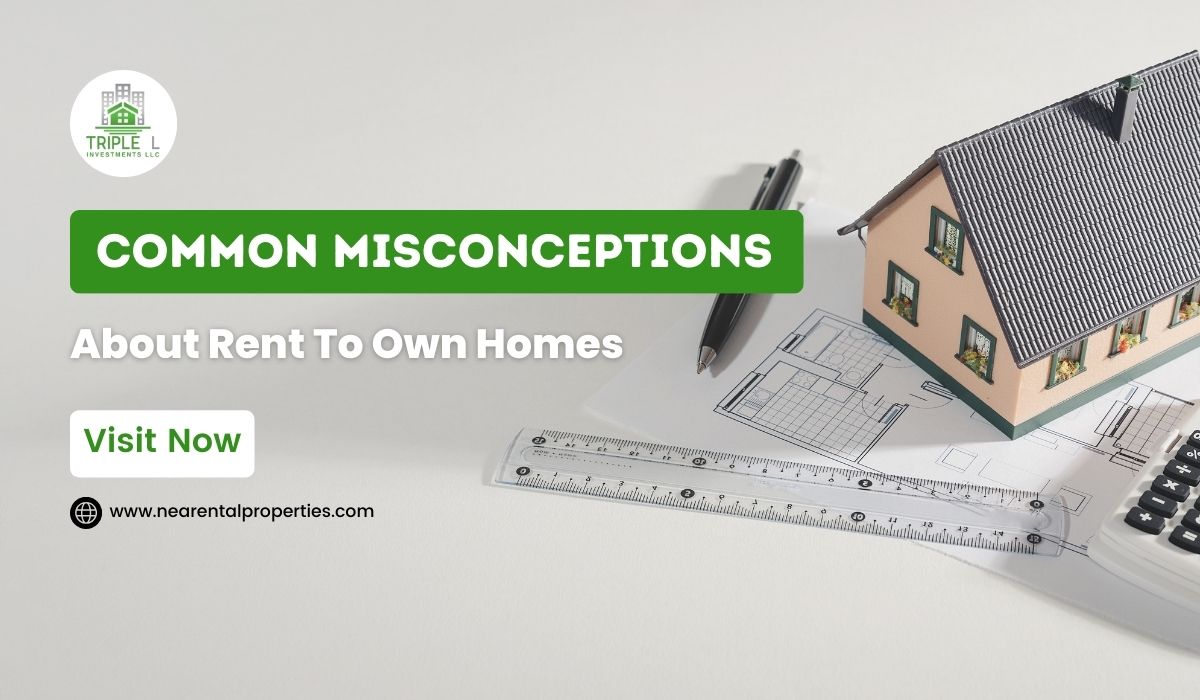Rent-to-own contracts combine aspects of renting and buying, enabling people to become homeowners. This agreement requires a tenant to rent a property for a specific duration. It also allows the tenant to buy the property at a prearranged price once the lease term concludes. This contract offers tenants the chance to reside in their preferred residence right away while simultaneously working towards future ownership.
Leases require monthly payments, and some of them can go toward a down payment. Furthermore, the contract specifies other provisions and stipulations about rent payments, maintenance obligations, option fees, and purchase terms.
Both tenants and landlords need to understand the complexities of rent-to-own contracts to ensure a smooth and mutually beneficial transaction. Individuals can confidently pursue their goal of becoming homeowners by thoroughly reviewing this contract.
Key Terms and Conditions Included in Rent-To-Own Contract
Rental Terms and Payments:
The payment plan and lease length are crucial elements that shape the overall arrangement in a rent-to-own deal. Tenants can buy a property during the lease term, usually lasting from one to three years. During this duration, occupants remit rental payments to the property owner, as specified in the lease contract.
You can designate a fraction of every rental payment as rent credit. A lease begins with a rent payment, rent credit, and purchase price agreement. Both parties must understand and adhere to the lease terms and payment structure throughout the lease.
Fees and Purchase Price:
The option fee and purchase price determine property purchase terms in a rent-to-own deal. At the beginning of the arrangement, the tenant pays the landlord an option fee to buy the property. Typically, these fees are non-refundable and pay the landlord to keep the property off the market. The purchase price agreed upon at the start of the contract remains fixed throughout the lease.
After exercising the purchase option, the tenant can buy the property at this amount. Both parties must negotiate a fair option fee and purchase price to reach a win-win arrangement. Landlords and tenants can control the sale price by understanding these agreements and following them.

Equity and Rent Credits:
Equity and rent credits shape rent-to-own financials. Tenants eventually create equity in the property. Through regular rent payments and potential rent credits, tenants can indirectly build equity by contributing to the property’s purchase. Tenants receive rent credits, usually a percentage of monthly rent, as a financial incentive. The renter usually gets these credits if they exercise their option to buy.
The accumulation of rent credits to reach a win-win arrangement, both tenants to lower the property’s purchasing price, increasing-to-own agreement, renters and landlords must understand equity and rent credits.
Requirements for Maintenance:
Rent-to-own contracts usually outline the repairs and preservation of the property. Like homeowners, tenants must keep the property in good condition. The package includes lawn care, landscaping, and property maintenance.
Tenants may also need to change light bulbs and air filters and fix plumbing concerns. The contract may specify landlord maintenance standards and expectations, ensuring clarity and accountability for both sides.
Tenants maintain the property, creating a pleasant living environment and preserving its worth for sale. To have a positive rental experience, tenants and landlords must understand and follow the rent-to-own contract’s property maintenance rules.
Insurance and Taxes:
In a rent-to-own relationship, both landlord and tenant must consider insurance and taxes. The tenant usually has renter’s insurance for personal belongings and liability, while the landlord has building insurance.
To avoid confusion and disagreements, the contract should clearly state insurance responsibilities. Since property taxes are an important part of homeownership, the landlord usually pays them during the rent-to-own period.
To clarify their financial obligations, tenants should specify these terms in the contract. The rent-to-own contract should handle insurance and taxes to protect both parties and clarify their responsibilities, making the rental experience smoother and more transparent.
Clauses of Termination and Default:
A rent-to-own contract’s termination and default terms define when the agreement can be canceled or declared in default. These sections outline the tenant and landlord’s obligations to keep the contract legitimate.
Tenants may default if they miss rent payments or neglect property maintenance. Conversely, landlords must provide habitable living circumstances and follow lease agreements. Termination clauses outline how either party can terminate the agreement early, usually with written notice and deadlines.
Default provisions may also require forfeiture of the option price or rent credits. The rent-to-own contract should include explicit termination and default clauses to protect both parties and reduce disputes, making the leasing process easier and more transparent.

Processes for Inspecting and Evaluating:
Inspection and evaluation are crucial in rent-to-own contracts to ensure the property’s condition and value match the conditions. Tenants can usually inspect the property before buying. Inspections may cover structural, mechanical, and aesthetic aspects of the home to find problems.
The appraisal can also determine the property’s fair market value, ensuring a fair acquisition price. Rent-to-own requires both parties to agree on contract inspection and appraisal processes.
Taking part in these procedures reduces risks and eases the move to homeownership by allowing tenants to make informed decisions—transparency and contractual compliance help landlords build confidence and responsibility in rent-to-own agreements.
Financial and Legal Considerations:
Legal and financial issues in rent-to-own contracts ensure clarity, protection, and compliance for tenants and landlords. Legally, you must analyze the contract to understand rights, obligations, and hazards.
Lease termination, default, and dispute resolution clauses should be examined. Legal guidance can also help ensure the contract follows local laws. Tenants must consider rent, option fees, and maintenance charges.
They should also consider creditworthiness and mortgage approval standards while securing finance for the home acquisition. However, landlords should evaluate tenants’ financial stability and ability to meet lease commitments. By addressing these legal and financial issues early, both parties can reduce risks and ensure a successful rent-to-own agreement.
Conclusion
Tenants and landlords must understand rent-to-own contracts to maintain a smooth and lucrative partnership.
By understanding the contract during the rental period, tenants can make informed decisions about their financial duties, rights, and responsibilities. The lease period, rent payments, option fee, purchase price, and rent credits must be understood. Tenants must also grasp their property maintenance, insurance, and termination agreements to avoid issues.
Ensuring the contract clearly states the terms helps landlords reduce risks and defend their interests. Understanding rent-to-own contract terms fosters openness, accountability, and trust in the contract.
Frequently Asked Questions
In most cases, the lease term specifies the length of the rental period, typically between one and three years.
The tenant pays the landlord rent each month in exchange for the right to occupy the property.
Tenants pay an option fee upfront to secure the exclusive right to buy a property at a predetermined price.
A rent credit is a portion of a monthly rent payment that accumulates toward the eventual purchase price.
Similar to homeownership, rent-to-own contracts typically require tenants to take care of routine maintenance and repairs.
Landlords maintain property insurance, while tenants may be required to obtain renters’ insurance.
Default or breach of contract are examples of circumstances under which termination clauses may apply.
Before finalizing the purchase, tenants can inspect the property to assess its condition.
Legal considerations ensure that the contract complies with local laws and regulations, ensuring both parties’ rights are protected.










